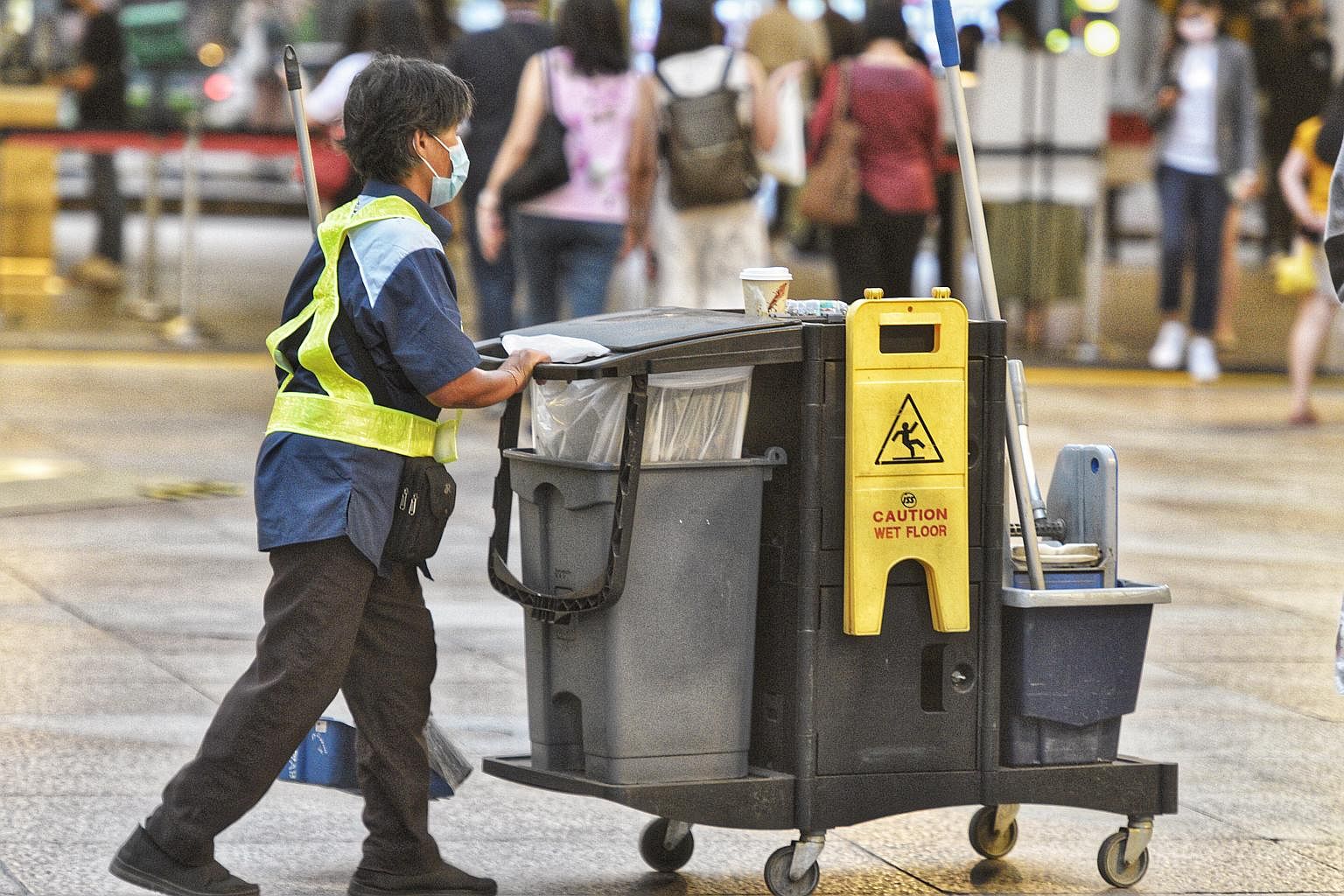Budget 2022: Govt to co-fund pay increases of local lower-wage workers between 2022 and 2026
Sign up now: Get ST's newsletters delivered to your inbox

An initial $2 billion will be set aside this year to fund this scheme, said Finance Minister Lawrence Wong.
PHOTO: ST FILE
SINGAPORE - Employers who raise the pay of their local lower-wage workers over the next five years will receive co-funding under a new scheme.
The Government will co-fund 50 per cent of pay increases made this year and next year, 30 per cent of pay increases in 2024 and 2025, and finally, 15 per cent of pay increases in 2026, Finance Minister Lawrence Wong said on Friday (Feb 18).
Under the new Progressive Wage Credit Scheme, these subsidies will apply for local workers - that is, Singaporeans and permanent residents - earning a gross wage of up to $2,500 a month.
For those earning above $2,500 and up to $3,000, there is a lower co-funding rate: 30 per cent for wage increases this year and next year, and then 15 per cent for increases in 2024.
Employers must make an average gross monthly wage increase of at least $100 in a year to qualify for the support for that year. The payouts will be credited automatically by the Inland Revenue Authority of Singapore by the first quarter of the year following the wage increases.
Mr Wong said in his Budget speech that an initial $2 billion will be set aside this year to fund this scheme, which is meant to provide transitional support for businesses as measures to boost the pay of the bottom 20 per cent of income earners are rolled out in the next few years.
"All of us - businesses, consumers and taxpayers - will have to do our part and contribute to uplifting our lower-wage workers," he said.
Prime Minister Lee Hsien Loong had announced during the National Day Rally last year that the Government had accepted the recommendations of the Tripartite Workgroup on Lower-Wage Workers, which included extending the Progressive Wage Model (PWM) to the retail, food services and waste management sectors, and to in-house cleaners, in-house security officers, in-house landscape workers, administrators and drivers across all sectors.
The model sets out minimum pay and training requirements for workers at different skill levels.
From September this year, companies employing foreign workers will also need to pay all local employees at least the local qualifying salary, which is currently set at $1,400 a month.
From March next year, companies with any workers in a PWM sector or occupation will need to be accredited with the new Progressive Wage Mark – meaning they follow the PWM and the local qualifying salary – in order to take on government contracts.
"I recognise that firms may need time to adjust to these changes," said Mr Wong.
"Some may have locked in long-term contracts based on certain wage assumptions and now face higher manpower costs. Others may find it difficult to raise prices in the short term to support the wage increases."
He assured employers that the initial injection of $2 billion into the Progressive Wage Credit Scheme fund will provide certainty of funding for the wage increases over the next five years.
Mr Wong also announced more support for more lower-wage Singaporean workers through enhancements to the Workfare Income Supplement scheme, which tops up their incomes and Central Provident Fund (CPF) savings.
From Jan 1 next year, eligible employees earning up to $2,500 a month - instead of up to $2,300 - will be able to qualify for payouts under the scheme.
The minimum age to qualify will be lowered to 30, from 35.
This new group of workers aged 30 to 34 will receive a maximum annual Workfare payout of $2,100, while other groups will have their payouts increased, said Mr Wong.
The maximum annual payout for those aged 35 to 44 will be $3,000, up from $1,700. It will be $3,600 for those aged 45 to 54 and those aged 55 to 59, instead of $2,500 and $3,300 respectively.
Those aged 60 and above will receive up to $4,200 a year, instead of up to $4,000.
All people with disabilities will receive up to $4,200 a year as well. Their payouts currently vary by age.
The payouts for self-employed people are set at two-thirds of the amounts for employees. The actual amount that people on the scheme receive depends on their incomes.
From next year, workers will need to earn at least $500 a month to qualify for Workfare. This new criterion is to encourage part-timers and casual workers to take up regular, full-time work, said Mr Wong.
Through these changes, Workfare is expected to benefit more than half a million workers, he added.
About 460,000 are on the scheme now.
Meanwhile, the expansion of the PWM, local qualifying salary requirement and Progressive Wage Mark requirement will cover about 94 per cent of full-time lower wage workers, said Mr Wong.
Together with Workfare, this should result in the incomes of lower-wage workers here growing faster than median wage growth over the coming decade, he added.
"So as our economy grows and society progresses, we will reduce income disparities in our workforce," he said.
In aggregate, the Government will spend an average of $1.8 billion a year over the next five years, or $9 billion in total, on the Progressive Wage Credit Scheme and Workfare, said Mr Wong, adding that the significant increase reflects its shared commitment to uplift lower-wage workers in Singapore.
Clarification note: An earlier version of this article said companies will need to be accredited with the new Progressive Wage Mark in order to take on government contracts from March next year. This has been updated to clarify that only companies with any workers in sectors or occupations with the Progressive Wage Model will need to be accredited.


